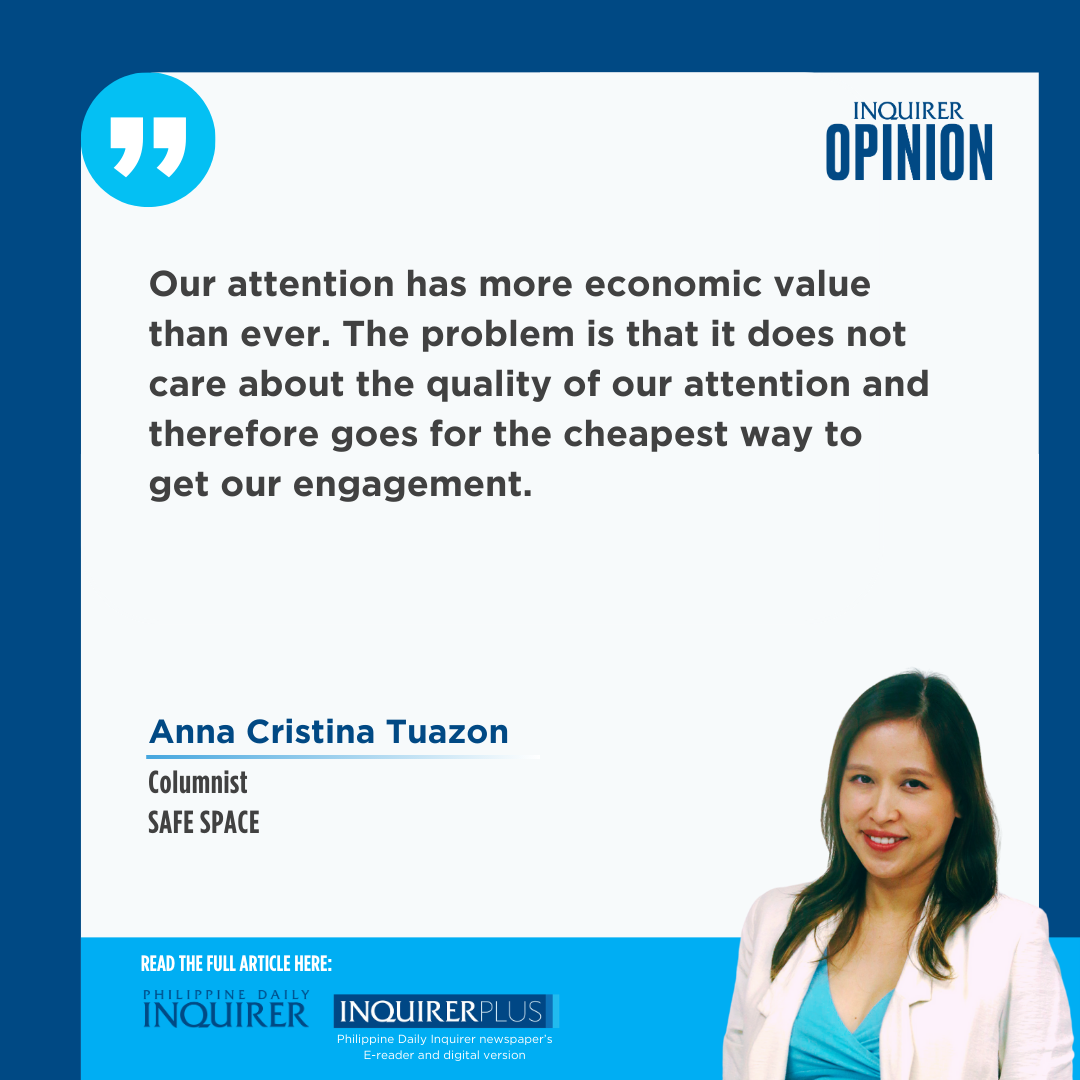The dangers of an ‘attention economy’
I was fortunate enough to have been part of a panel at the general assembly of the People Management Association of the Philippines last week that discussed the role of media in e-commerce and business innovation. It was a diverse panel, to say the least, with Vince Jaen of MBC Media Group representing business and Luchi Cruz-Valdes of TV5 representing journalism. Vince was straightforward about how they maximize social media toward building multiple income streams. Luchi, on the other hand, warned us of its dangers and how it has facilitated the proliferation of scams and other abuses of access to consumer information. For my part, I attempted to convince people that one can aim for a win-win solution where business and people—consumers, workers, and community—can grow together without exploitation if businesses value long-term sustainability over short-term profit. My statements turned out relatively idealistic compared to my fellow panelists, who were concerned about how business and journalism can survive in the “attention economy,” as Vince mentioned.
I have never worked for a corporation. I also have never been hired to increase revenues or make profit. I realized, being in that panel, what a privilege I have in not being beholden to market forces. When I was accepting the award for Best Newspaper Columnist for the 12th Makatao Awards for Media Excellence at the same event, I clumsily thanked my editors for the “freedom to write whatever I want.” What I truly meant to say, now that I can really appreciate this position that was given to me, is that our editors had never leaned on us to write about certain topics or limit us to certain perspectives. They never had us chase views, likes, or reader engagement. They did not give me performance metrics for what constitutes a “successful” column. The only feedback I ever received from them were for typographical or stylistic errors in my writing. I also never felt I had to stay squarely in my “lane,” which is mental health and families. They allowed me to integrate my expertise toward national concerns and issues, usually the domain of lawyers, economists, and political scientists.
Media companies, however, are not as lucky. As a private entity, they cannot afford to remove money and profit from the equation. They are dependent on either subscriptions or ad revenues. In the social media age, this comes from engagement—clicks, likes, and comments. A story that nobody reads cannot pay the bills. And so, media now are chasing for people’s attention. Attention as its own value can encourage questionable tactics. Rage bait, for example, is where posts and articles intentionally incite rage and upset, which then motivates people to post comments or share the article. The idea there is to evoke a strong enough reaction so that people who agree with the article shares it to prove their point while at the same time people who disagree with it also share it as a backdrop for their counterpoint. The problem with rage bait is that it intentionally distresses its audience—already unethical. It is also very effective in increasing engagement, which translates to higher monetization and ad value. We have developed a revenue strategy that rewards us for hurting people.
Trendjacking is another social media tactic where brands hop on a current trend to stay relevant and top of mind. We see this most recently with the brands congratulating Carlos Yulo in their creative ways, more to emphasize their brand rather than to actually celebrate Yulo’s win. We also see trendjacking on political trends, such as brands making puns and mocking the controversial book “Isang Kaibigan” of the Vice President. Trendjacking is not as directly harmful as rage bait, though using political scandals and concerns as part of brand marketing can risk diminishing the seriousness of these issues. Trendjacking is effective because it aligns with humor, a known Filipino way of coping through tough times. While humor is good in the short term and allows us not to wallow in misery, it can decrease the seriousness of a situation that then leads to political inaction. How many jokes have we done about traffic, flooding, and corruption? And how many of those jokes have led to serious political movements that can actually solve these issues? When we make fun of the Vice President’s book, we feel relief as if we had just rendered some form of irreverent justice by turning them into the butt of our jokes. But the ultimate joke is still on us, as the systems that allowed government funds to be used in unscrupulous ways are still very much in play.
Our attention has more economic value than ever. The problem is that it does not care about the quality of our attention and therefore goes for the cheapest way to get our engagement. If attention truly does have value, then let’s use our attention to spotlight important concerns and have the economy pay attention to what truly matters.
—————-
aatuazon@up.edu.ph

















